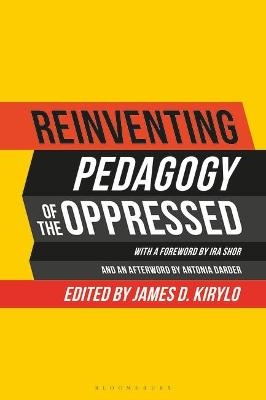
Reinventing Pedagogy of the Oppressed
Bloomsbury Academic (Verlag)
978-1-350-11717-4 (ISBN)
James D. Kirylo is Professor of Education at the University of South Carolina, USA. Among other books, he is author (with Drick Boyd) of Paulo Freire: His Faith, Spirituality, and Theology (2017), Teaching with Purpose: An Inquiry into the Who, Why, and How We Teach (2016) and Paulo Freire: The Man from Recife (2011).
Foreword: On the Road to Social Justice: Reinventing Paulo Freire
Ira Shor (City University of New York, USA)
Introduction: James D. Kirylo (University of South Carolina, USA)
Part I: The Criticality of Teacher Preparation
1. Preparing Foundational Phase Educators: Reading the Word and World through Transect Walks
Deidre Geduld, Ivor Baatjes, and Heloise Sathorar (Nelson Mandela University, South Africa)
2. W.E.B. DuBois and Paulo Freire: Toward a ‘Pedagogy of the Veil’ to Counter Racism in Early Childhood Education
Meir Muller (University of South Carolina, USA) and Nathaniel Bryan (Miami University Ohio, USA)
3. The Community as a Teacher Educator: Preparing Critically Conscious Teacher Candidates in Detroit
Kaitlin Popielarz (Wayne State University, USA)
Part II: Pedagogy and Practice
4. Making Meaning in the Carceral Space: Freirean Dialogue and Existential Becoming in the Jail or Prison Classroom
Gregory Bruno (Kingsborough Community College, City University of New York, USA)
5. Critical Race Counterstories and Freire’s Critical Pedagogy: Navigating Race in an Interdisciplinary Literature and Religious Studies Course
Soumitree Gupta (Carroll College, USA) and Gerardo Rodríguez-Galarza (St. Norbert College, USA)
6. Toward a Software of the Oppressed: A Freirean Approach to Surveillance Capitalism
Erin Rose Glass (UC San Diego, USA)
7. Freirean Cultural Circles in a Contemporary Social Studies Class
Shelley Martin-Young (Oklahoma State University, USA)
8.The Liberatory Potential for Teacher Mindfulness
Amy E. Laboe (University of Virginia, USA)
9. Who’s in Charge?: Teacher Authority and Navigating the Dialogical-Based Classroom
A.J. Tierney (Oklahoma State University, USA)
Part III: The Intersection of Paulo Freire and Myles Horton, Martin Luther King, jr., and Simone De Beauvoir
10. “To Speak a Book”: Lessons from Myles Horton and Paulo Freire’s We Make the Road Walking
Jon Hale and Alexandra Bethlenfalvy (University of South Carolina, USA)
11. The Beloved Community and Utopia: Hope in the Face of Struggle as Envisioned by Martin Luther King, Jr. and Paulo Freire
Drick Boyd (Eastern University, USA)
12. Less Certain But No Less Committed: Paulo Freire and Simone de Beauvoir on Ethics and Education
Peter Roberts (University of Canterbury, New Zealand)
Part IV: Policy, The Environment, and Liberation Theology
13. Ley de Reforma Educativa de Puerto Rico: A Freirean Perspective
Patricia M Virella (Sarah Lawrence College, USA) and Jennie Weiner (University of Connecticut, USA)
14. Overcoming (In)Difference: Emancipatory Pedagogy and Indigenous Worldviews toward Respectful Relationships with the More-Than-Human World
Jennifer Markides (University of Calgary, Canada)
15. We Write on the Earth as the Earth Writes on Us: Paulo Freire the (Post)Humanist
Tricia M. Kress (Molloy College, USA) and Robert Lake (Georgia Southern University, USA)
16.The Postdigital Challenge of Paulo Freire’s Prophetic Church
Peter McLaren (Chapman University, USA) and Petar Jandric (Zagreb University of Applied Sciences, Croatia)
Part V: Reflections, Experiences, And Considerations
17. Pursuing Critical Consciousness on the Tenure Track: Toward a Humanizing Praxis within the Neoliberal University
Rolf Straubhaar, Sara Torres, Sascha Betts (Texas State University, USA)
18. Living in the Contradictions: LGBTQ Educators and Critical Pedagogy
Dena Lagomarsino (Tulane/New York University, USA)
19. An Eye-Witness Account of Freire’s Return Back to Brazil after the Exile: Personal Reflections on Fighting Oppression
Nelio Bizzo (University of São Paulo, Brazil)
20. Dare to Hope: The Art of Untying the Tongue and Awakening the Resilient Spirit
Débora B. Agra Junker (Garrett-Evangelical Theological Seminary, USA)
Afterword: Paulo Freire Fifty Years Later
Antonia Darder (Loyola Marymount University, USA)
References
Index
| Erscheinungsdatum | 01.05.2020 |
|---|---|
| Verlagsort | London |
| Sprache | englisch |
| Maße | 152 x 229 mm |
| Gewicht | 420 g |
| Themenwelt | Sozialwissenschaften ► Pädagogik ► Allgemeines / Lexika |
| Sozialwissenschaften ► Pädagogik ► Bildungstheorie | |
| ISBN-10 | 1-350-11717-X / 135011717X |
| ISBN-13 | 978-1-350-11717-4 / 9781350117174 |
| Zustand | Neuware |
| Haben Sie eine Frage zum Produkt? |
aus dem Bereich


